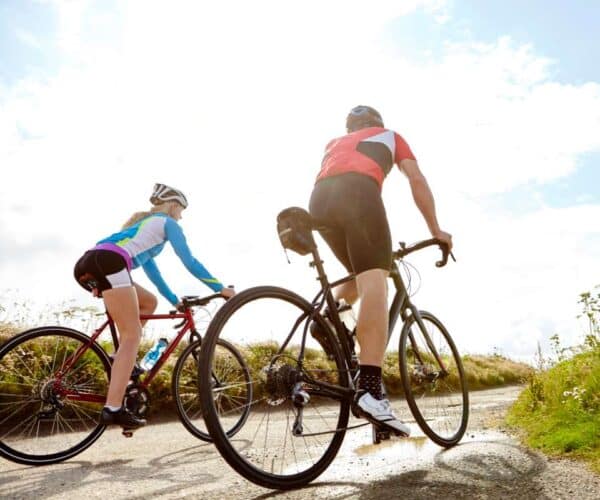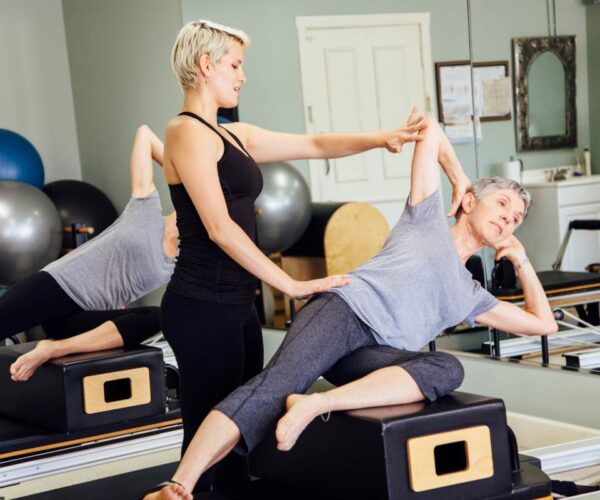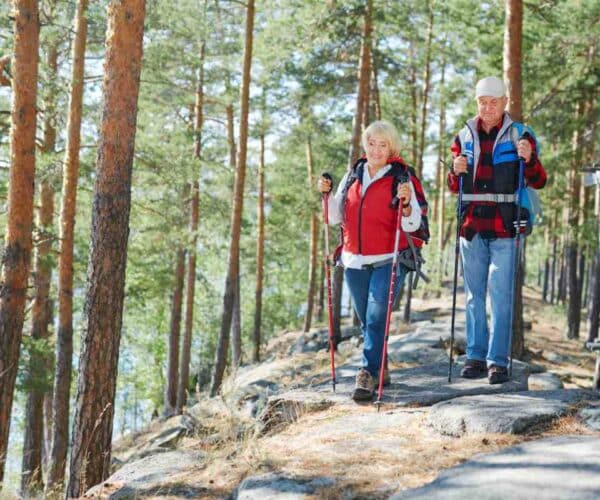Looking after ourselves isn’t just a nice idea – it’s essential if we want to stay healthy and independent as we get older. The choices we make now about how active we are will shape not only our fitness but also our quality of life in the decades to come. That’s why the NHS and other health bodies are putting more emphasis than ever on the role of regular sport and exercise in preventing illness, boosting wellbeing, and protecting us against the aches and ailments that creep in with age.
Of course, life isn’t always straightforward. Careers, families, health challenges and even geography all weave us down different paths, and the types of sport or exercise that suit us best often shift as we move through life’s stages. What feels exciting and social in your 20s might feel punishing in your 40s, while in your 70s you might discover a whole new activity you’d never have considered earlier on.
And then there are the barriers; lack of time, cost, confidence, or worries about not being “fit enough” to start. These are real challenges, but they’re not insurmountable. With a few smart choices and the right support, there’s a way for everyone to bring sport into their routine, no matter their age or starting point.
So, why take up a new sport as an adult, which activities are best suited to different decades of life, and how can you overcome the hurdles that might be holding you back? Let’s break it down – and bust a few myths along the way.
Why bother starting a new sport as an adult?

We all know exercise is “good for us”, but starting a sport is about so much more than burning calories.
1. Physical health
Regular sport keeps your heart strong, bones healthy, and muscles working. It helps manage weight, lowers blood pressure, and reduces the risk of conditions like type 2 diabetes.
2. Mental wellbeing
Sport is one of the best natural stressbusters. It boosts mood, sharpens focus, and can even slow cognitive decline as we age.
3. Social life
Joining a team or club means meeting new people, building friendships, and being part of a community.
4. Personal growth
There’s something brilliant about learning a new skill or testing yourself with a challenge you didn’t think possible.
5. Fun
Let’s not forget – sport should be enjoyable! It’s a chance to play, laugh, and rediscover that childlike energy.
Sport England’s surveys show that nearly half of adults in England take part in some form of regular activity. As you go through life, physique and personal preferences may change and it could lead you to seek a different fitness format or start from scratch.
Things to think about when choosing a sport
Before you throw yourself into something new, it’s worth pausing to consider:
- Your current health: Do you have injuries or conditions to work around? If so, low-impact sports might suit you best.
- Mobility & flexibility: Certain sports are kinder to joints than others.
- Time & lifestyle: How much time can you realistically give each week?
- Cost & kit: Some sports require expensive equipment, others need little more than trainers.
- Facilities near you: Is there a local club, swimming pool, or climbing centre?
- Solo vs social: Do you prefer working out alone, or does the idea of a team keep you motivated?
Don’t overthink it. Start small, try a taster session, and see what feels right.
The best sports to take up by decade

Your 20s and 30s: high energy and new horizons
In your 20s and 30s you’re often at peak fitness, but time and money can feel tight thanks to work, studies, or young families. This is a great stage for high-energy sports that challenge your endurance and give you a social outlet.
Running and Triathlon: Affordable, accessible, and full of events to train for. Parkruns (free 5k runs held across the UK) are hugely popular. Triathlons add swimming and cycling into the mix if you want variety.
Climbing and Bouldering: Indoor climbing gyms are booming in UK cities. It’s physically demanding, brilliant for strength and flexibility, and surprisingly sociable.
Team sports: Football, rugby sevens, hockey, netball – all have adult leagues with beginner-friendly sides. Great for camaraderie and fitness.
Boxing & Martial Arts: Excellent for stress relief, discipline, and full-body workouts.
Why now? Your recovery is quick, your energy is high, and you’ll enjoy the mix of challenge, social connection, and fitness gains.
Your 40s: balance and stress relief
By your 40s, life can feel like a juggle – careers, children, caring for relatives. Sport becomes less about raw energy and more about balance, stress relief, and keeping strong.
Tennis and Squash: Brilliant for fitness and coordination. Many UK clubs offer “Rusty Rackets” sessions for adults returning to the game.
Cycling: Low impact and flexible – you can cycle to work, go for weekend rides, or join a local club. The UK has a thriving cycling culture with options for all levels.
Yoga & Pilates: Perfect for tackling stiffness from desk jobs. Builds core strength and flexibility, while also helping with stress.
Golf: A slower-paced sport, but still great for walking fitness, focus, and friendly competition.
Why now? You may notice you don’t bounce back from injuries like you did in your 20s, so lower-impact activities with recovery benefits are smart.
Your 50s: health focus and rediscovery
Many people in their 50s find themselves with a bit more time as children become more independent. This is a decade for putting health first, reconnecting with old hobbies, or trying something new.
Swimming and Open-Water Swimming: Gentle on joints, calming, and brilliant for cardiovascular health. The rise of outdoor swimming in UK lakes and lidos makes it exciting and accessible.
Badminton: Fast-paced, but easier on the body than football or rugby. Great for agility and coordination.
Walking Football & Walking Netball: These modified versions of the games are growing quickly across the UK and are designed for over-50s.
Pilates & Strength Training: Essential for maintaining muscle mass, protecting bones, and improving balance.
Why now? Midlife health checks often bring fitness back into focus. These sports combine social benefits with low risk of injury.
Your 60s: movement and community
In your 60s, staying active is one of the best investments in your independence. It’s about keeping mobile, maintaining balance, and enjoying social circles.
Golf: Continues to be popular for good reason – fresh air, gentle exercise, and plenty of conversation.
Table Tennis: Keeps reflexes sharp and is proven to support cognitive health.
Rambling & Hiking: The Ramblers UK groups are welcoming, with walks for all abilities. It’s a fantastic way to enjoy Britain’s countryside.
Tai Chi: Low impact and meditative, it helps with balance, coordination, and relaxation.
Why now? The focus shifts towards staying mobile and connected while preventing age-related decline.
Your 70s and beyond: gentle activity, big rewards
Sport at this stage is about maintaining independence, boosting mental health, and enjoying a sense of community.
Walking: The most accessible of all – whether alone or with a group.
Aqua Aerobics: A supportive environment for those with arthritis or joint pain.
Chair Yoga: Keeps flexibility and mobility without having to get down on the floor.
Bowls: Gentle but social – bowls clubs are community hubs across the UK.
Dance: Sequence, line dancing, ballroom – keeps you moving while lifting spirits.
Why now? Even light movement brings huge benefits. Staying active can mean staying independent for longer – and it’s a lot of fun.
Barriers to starting (and how to beat them)

Even when we know how good sport could be for us, getting started can feel daunting. Life is busy, money can be tight, and the thought of walking into a new class or club as a beginner can be intimidating. These barriers are real — but they don’t have to stop you. With a little planning and the right mindset, most of them can be worked around. Here are some of the most common stumbling blocks adults face, and how to get past them:
“I don’t have time” → Start with short sessions. A 20-minute walk or a weekly class is better than nothing.
“It’s too expensive” → Many sports are low-cost. Running, walking, and bodyweight training are almost free. Second-hand kit and community classes keep costs down.
“I’m not fit enough” → Beginner programmes exist for every sport. Parkrun welcomes walkers, yoga has chair-based options, and clubs love new joiners.
“I’ll look silly” → Everyone starts somewhere. Most people are too focused on their own game to judge others.
Tips for getting started
The hardest step is often the first one. Once you’ve begun, momentum builds naturally. Here are some practical ways to set yourself up for success:
- Start slow, don’t rush: Begin with manageable sessions and increase gradually. Pushing too hard too soon only leads to injury or frustration.
- Invest in the basics: A good pair of shoes or suitable kit will make you more comfortable and reduce the risk of injury. You don’t need top-of-the-range gear, just something that supports you properly.
- Find a buddy: Whether it’s a friend, colleague, or neighbour, having someone to exercise with boosts motivation and makes it less intimidating.
- Look for taster sessions: Many gyms, clubs, and community groups offer free or low-cost trial classes. It’s a no-pressure way to dip your toe in and see if you enjoy it.
- Celebrate small wins: Keep track of milestones — your first swim without stopping, your first yoga class, your first 5k walk. These markers keep you motivated and show just how far you’ve come.
- Make it part of your routine: Block out time in your diary like you would for a meeting or appointment. Treating it as non-negotiable makes it easier to stick with.
- Stay curious: If one sport doesn’t click, try another. The goal is finding something you genuinely enjoy, not forcing yourself into a routine that feels like a chore.
It’s never too late to find “your” sport. Whether you’re 25 or 75, there’s something out there that can fit your lifestyle, boost your health, and bring you joy. From park runs to bowls clubs, open-water swims to walking netball, the UK is full of welcoming communities waiting for you to join in.
Take up a new sport with confidence; don’t forget sports insurance
Whatever stage of life you’re in, trying parkrun in your 20s, taking up tennis in your 40s, or joining walking football in your 60s, more adults are challenging themselves with new sporting goals. It’s exciting, rewarding, and great for your health, but it’s also worth thinking about the protection you’ll need if something goes wrong.
At SportsCover Direct, we offer two types of specialist policies. Our Sports Accident Insurance provides financial support if you’re injured while training or competing, with benefits including personal accident cover, legal expenses, and income protection. This policy is valid worldwide but doesn’t include medical treatment abroad or repatriation, so it’s best suited for covering the financial impact of accidents rather than medical emergencies.
If you’re taking your sport overseas, our Sports Travel Insurance is the better fit. It covers medical treatment and repatriation, as well as cancellations, delays, and sports equipment. With cover for over 500 sports, you can choose a full travel policy or a bolt-on if you already have standard travel insurance that doesn’t include your chosen activity. With the right cover in place, you can focus on enjoying your sport — at home or abroad — without added worries.
Find out more about our sports polices when you get a quote online!
This blog has been created as general information and should not be taken as advice. Make sure you have the correct level of insurance for your requirements and always review policy documentation.